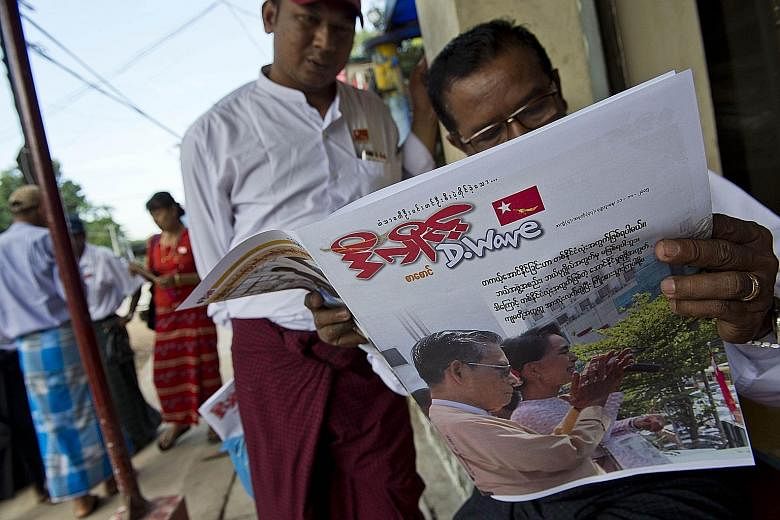Myanmar's President Thein Sein, a former top army general who has steered the country through five years towards the free market and democratic reforms, has accepted an invitation to meet opposition leader Aung San Suu Kyi but only after the official results of the Nov 8 election are declared.
Ms Suu Kyi is head of the National League for Democracy (NLD), which is heading for a resounding win in Sunday's election.
She had sent a letter yesterday asking for talks with President Thein Sein, armed forces chief Min Aung Hlaing and Parliament Speaker Shwe Mann.
"Citizens have expressed their will in the election," she said in the letter, posted on Facebook by the NLD. "I would like to invite you to discuss national reconciliation next week at a time of your convenience."
President Thein Sein's spokesman, Information Minister Ye Htut, responded a short while later, posting on his official Facebook page that a "bilateral meeting will be held" after the election process is completed. Election officials have said this could take another 10 days.
Mr Ye Htut also reiterated that the government would abide by the outcome of the election and "work peacefully in the transfer" of responsibilities to the NLD.
Mr Shwe Mann, on his Facebook page, said that he would meet the opposition leader next week. Mr Shwe Mann, who ran as a candidate for the military-backed Union Solidarity and Development Party (USDP) and lost his seat to his NLD rival, was one of the first ruling party members to publicly concede defeat. But the former general is close to Ms Suu Kyi and, because of that, has been in a precarious position in his own party.
There was no word on the army chief's response to Ms Suu Kyi's letter.
In results declared thus far, the NLD has taken 163 out of 182 seats in the bicameral Parliament. Party members and analysts believe the NLD is heading for close to 500 seats in the 664-seat Parliament, giving it a solid mandate to form the next government.
The USDP has been routed in the polls, and may end up with a paltry three dozen-odd seats.
But the military remains a significant force in Parliament because a quarter of its seats has been reserved for them under the Constitution. Equally important, the military appoints three key ministers - for border affairs, defence and home affairs.
The Constitution also bars Ms Suu Kyi from becoming president due to her foreign family connections. Her late husband was a British citizen, and her two sons are also British citizens.
But in public statements and interviews in recent days, she has made it clear that, as leader of the majority party, she will have the right to nominate a candidate for president, adding that she herself will be "above the president".
The proposed talks will be the first test of the ability of the key players to compromise - a quality that neither the military nor Ms Suu Kyi is known for.
Finding a formula that does not threaten the army's interests is seen as the key to a stable transition - a process that in Myanmar's system will culminate only next March with newly elected MPs voting for the president.
Ms Suu Kyi's critics are warning that "hubris" could threaten such a compromise.
"Saying she will be above the president is not a great way to start reconciliation talks," one analyst said, asking not be identified.
Mr Michael Aung-Thwin, professor of Asian studies at the University of Hawaii, wrote in an e-mail: "As head of the party that wins, she will de facto call the shots. So, she's being blunt and also testy about it."
Professor Robert Taylor, a prominent Britain-based expert on Myanmar, said that the army would accept the election result if the majority party in Parliament did not try to change the Constitution precipitously and demonstrated that it would nominate a president whom the military could trust.
"As for her claiming to be above the president, that is a constitutional impossibility," he said.
Former British ambassador to Thailand Derek Tonkin, who runs the Network Myanmar website, cautioned that "Suu Kyi needs the military and the military needs her".
"Unless they can agree on a modus vivendi, Myanmar could find itself with two governments - one military and the other civilian," he added.

